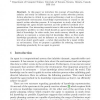Free Online Productivity Tools
i2Speak
i2Symbol
i2OCR
iTex2Img
iWeb2Print
iWeb2Shot
i2Type
iPdf2Split
iPdf2Merge
i2Bopomofo
i2Arabic
i2Style
i2Image
i2PDF
iLatex2Rtf
Sci2ools
113
click to vote
AIMSA
1998
Springer
1998
Springer
Knowledge Granularity and Action Selection
Abstract. In this paper we introduce the concept of knowledge granularity and study its influence on an agent's action selection process. Action selection is critical to an agent performing a task in a dynamic, unpredictable environment. Knowledge representation is central to the agent's action selection process. It is important to study what kind of knowledge the agent should represent and the preferred methods of representation. One interesting research issue in this area is the knowledge granularity problem: to what detail should an agent represent a certain kind of knowledge. In other words, how much memory should an agent allocate to represent a certain kind of knowledge. Here, we first study knowledge granularity and its influence on action selection in the context of an object search agent - a robot that searches for a target within an environment. Then we propose a guideline for selecting reasonable knowledge granularity for an agent in general.
Action Selection | Agent's Action Selection | AIMSA 1998 | Artificial Intelligence | Knowledge Granularity |
Related Content
| Added | 05 Aug 2010 |
| Updated | 05 Aug 2010 |
| Type | Conference |
| Year | 1998 |
| Where | AIMSA |
| Authors | Yiming Ye, John K. Tsotsos |
Comments (0)

